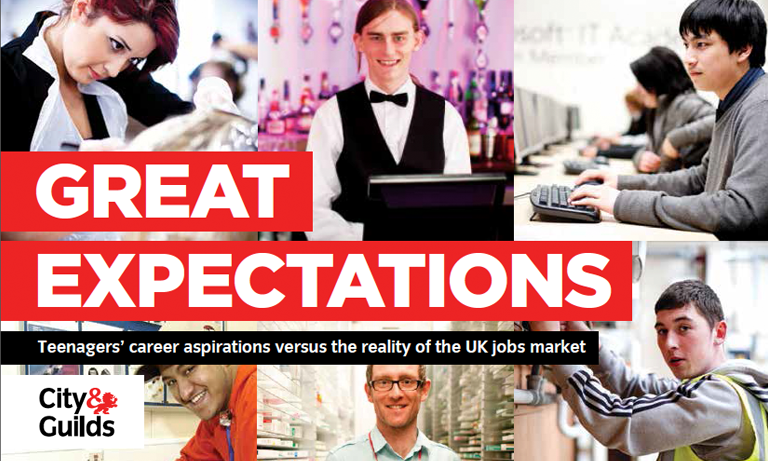 The survey of over 3,000 14-19 year olds found young people were largely misinformed about how to secure their dream job
The survey of over 3,000 14-19 year olds found young people were largely misinformed about how to secure their dream jobAlmost 70% of respondents stated that they planned to go to university despite only 30% of available jobs forecast to be graduate roles.
The vast majority of young people still believe university is the only route to a good career, according to a report out today from leaders in skills development, City & Guilds. The report, ‘Great Expectations’, found that over two thirds (68%) of 14-19 year olds planned to go to university despite a third of them not knowing what they would study.
The survey of over 3,000 14-19 year olds found young people were largely misinformed about how to secure their dream job with little understanding of the best routes to get there. Despite 70% of young people claiming they have the information needed to pursue their future career, only 28% of respondents thought previous work experience matters. In contrast recent City & Guilds research found that most employers (78%) see it as essential.
Teenagers also had a low awareness of the range of jobs available when it came to choosing their dream career – two thirds of all the available jobs were entirely overlooked by respondents. City & Guilds worked with economic modellers EMSI to map responses against the available jobs now and in the future to show the mismatches between aspiration and reality and found that;
- 26% of respondents would like to work in professional, scientific and technical roles, whereas the proportion of people working in this sector is forecast to be 9% in 2022.
- 19% wanted to work in education, whereas just 8% of the population will be employed in this sector in 2022.
- 19% of respondents selected information and communication as their industry of choice, yet the proportion of people who will be working in this sector in 2022 is predicted to be just 4%.
- In contrast, just 3% opted to work in the wholesale and retail or motorcycle and motor vehicle repair sectors when 15% of all jobs will be available in these industries.
Kirstie Donnelly MBE, Managing Director, City & Guilds said:
“Today’s findings highlight a concerning mismatch between the aspirations of young people and the reality of the jobs market they will be entering.
“While university is a great path for many people, it’s not the only one. It’s time we told our young people the truth about the best way to get into work and broadened their horizons so they understand the full range of jobs available. Employers need much more involvement in schools and colleges and young people need more opportunities to interact with employers to inform and inspire them about a far greater range of jobs. They also need to be given access to impartial careers advice informed by the local labour market so they know that they are selecting careers in areas where jobs will be available to them.”
The lack of access to careers advice was evident in the research with almost a third of respondents (28%) stating that they heard about their career from the media and only 14% of those surveyed saying they learned about their chosen career path from a careers advisor. The survey also showed that young people don’t see the importance of careers advice. Just 5% said that a careers advisor would help the most in getting a job they would be satisfied with and when asked why they were thinking of a certain career, only 14% said that a careers advisor had recommended it.
Leo Quinn, CEO of Balfour Beatty added:
“It’s vital that the opportunities offered by apprenticeships are understood by students and their parents. The UK economy increasingly needs workers that are highly skilled and motivated, as technology replaces many traditional jobs. Apprenticeships offer an alternative path from academic education into the workplace, providing these skills and the knowledge which will be the basis of a long and successful career.”
Andy Durman, Managing Director, EMSI said the report highlights an urgent need for better careers advice in the UK:
“It’s clear from this research that a new model for careers advice in the UK is needed. Instead of focusing on a young person’s likes and dislikes and suggesting a suitable career match, we believe a better model would match young people and their skills to relevant careers that do actually exist in the local or national jobs market. Only by equipping careers advisors with up-to-date local labour market information can we hope to give young people realistic advice that may actually help them to get a job.”
To better equip young people for employment, City & Guilds is currently rolling out a new curriculum for 14 – 19 year olds, the City & Guilds TechBac, across the UK. The TechBac has been developed with employers in sectors with large reported skills gaps as well as the biggest growth potentials and combines industry specific and general workplace skills development with on-the-job experience. TechBac students will be well equipped to move into an apprenticeship, on to higher education or straight into a job.
Leo Quinn said:
“City & Guilds have a long record of setting the standard for workplace training and apprenticeship. I’m proud that Balfour Beatty is involved in the City & Guilds TechBac, providing the opportunity to highlight to young people the exciting variety of jobs available in the construction industry – potentially inspiring them to an apprenticeship and a career in construction underpinned by a high quality training.”
Get The Recruiting Times FREE every Monday – SUBSCRIBE NOW
Recruiters love this COMPLETE set of Accredited Recruitment & HR Training – View Training Brochure








